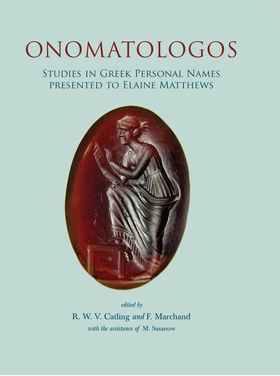
Lägg till önskelistan
Onomatologos e-bok
Pris
115 kr
Onomatologos is a term used in later antiquity to describe eminent lexicographers such as Hesychius and Pollux as 'collectors of words', but here it is used as the title for a major volume of papers prepared in honour of Elaine Matthews, recently retired long-serving editor of the Lexicon of Greek Personal Names ( LGPN ): a 'collector of names'. The LGPN , conceived by Peter Fraser, has had as its primary aim the documentation on a geographical basis of the personal names attested betwee...
E-Bok
115 kr
Pris
Förlag
Oxbow Books
Utgiven
15 Februari 2021
Längd
680 sidor
Genrer
Historia & Arkeologi, Fackböcker
Språk
English
Format
epub
Kopieringsskydd
Vattenmärkt
ISBN
9781842177891
Onomatologos is a term used in later antiquity to describe eminent lexicographers such as Hesychius and Pollux as 'collectors of words', but here it is used as the title for a major volume of papers prepared in honour of Elaine Matthews, recently retired long-serving editor of the Lexicon of Greek Personal Names ( LGPN ): a 'collector of names'. The LGPN , conceived by Peter Fraser, has had as its primary aim the documentation on a geographical basis of the personal names attested between the earliest use of the Greek alphabet (c. 750 BC) and the early seventh century AD throughout the Hellenic and hellenized world, wherever the Greek language and script was used. The 55 contributions to this volume reflect well the breadth of LGPN itself, extending to all points of the compass far beyond the Greek heartlands bordering the Aegean sea, as well as the wide range of disciplines to which the study of personal names can be applied. Besides their honorific purpose, it is intended that the contributions will further advance this field of study, revealing some of the potential that has been unlocked by the systematic documentation of the evidence, mainly from inscriptions and papyri, that has accumulated over the last century. The papers presented here amply demonstrate the value of this raw material for linguists and philologists, students of Greek and Latin literature, epigraphists, papyrologists, numismatists and prosopographers, as well as social historians with broader interests in the geographical and chronological distribution of personal names.




